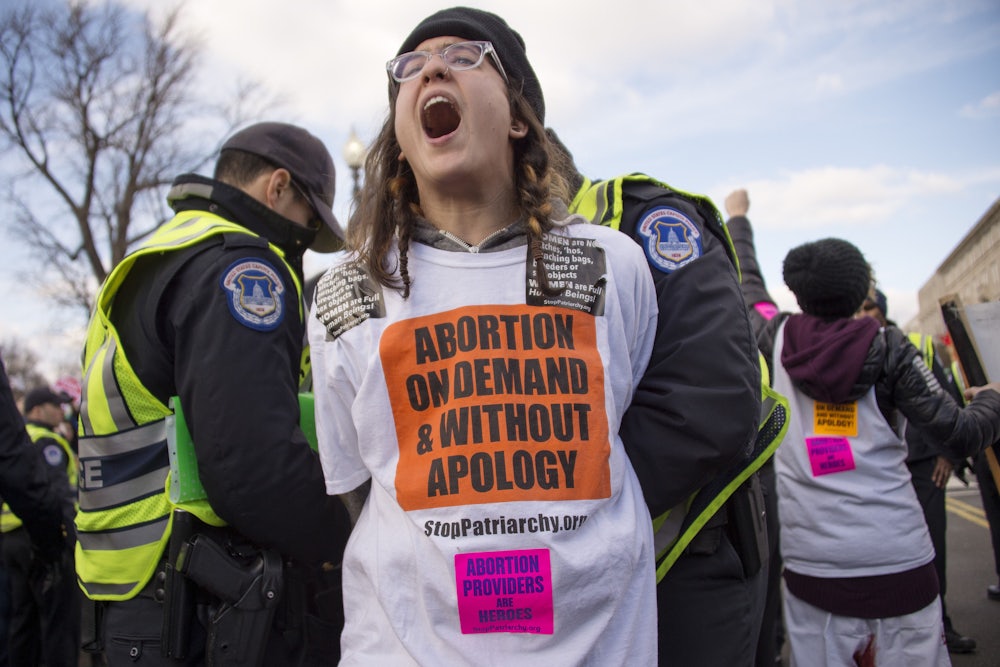In 2010, Nebraska became the first state to pass a 20-week ban on abortion, but it certainly wasn’t the last. The law was soon emulated by several other states, including Idaho, Indiana, and Alabama. The real goal of those who pushed to codify the arbitrary 20-week mark as some sort of bright line—based on bogus science pushed by anti-abortion activists, who claimed a fetus could feel pain at that gestational age—was clear at the time and even more obvious now: It was meant, as one anti-abortion lobbyist put it, to “push the envelope” when it came to Roe v. Wade’s stance on viability.
These bans were unconstitutional and cruel—yet they were framed by their proponents as a reasonable, moderate compromise, seemingly supported by polls indicating a majority of Americans supported 20-week bans. (These polls are determined in no small part by their wording and framing. To quote the activist and writer Jenny Brown, one might of course get a different answer to these surveys if people were asked, “Do you think someone should be forced to carry and bear a baby against her will once she is 20 weeks pregnant?”)
As the Supreme Court, dominated by conservative, anti-abortion justices, is poised to hear oral arguments on Mississippi’s unconstitutional 15-week ban, a chorus of voices has emerged to say that banning abortions after three months is acceptable. But we should nip this foolish logic in the bud. A 15-week ban is not reasonable or moderate or a compromise worth swallowing, however reluctantly. Like any other ban at any point in someone’s pregnancy, we should recognize it for what it is—an assertion of the state’s power in determining when and how we’re made to have children, not a medical or moral middle ground.
Last month, Jon A. Shields, a self-described “conservative professor” at Claremont McKenna College, made the unconvincing case for a “liberal compromise on abortion” in the pages of The New York Times. Writing that “common moral intuitions about abortion” have “quietly moderated” what he called a “liberal civil war,” Shields pointed to the fact that about half of all abortion clinics only offer the procedure up to 15 weeks. This he interpreted as proof that even abortion providers “choose to restrict the scope of this expansive right.” What Shields neglected to mention were the actual reasons many clinics and providers are forced to limit the abortions they provide—laws passed by Republican legislatures that have targeted clinics’ ability to operate. As two researchers noted in 2009, “These regulations cause physicians to change their clinical practices or reduce the maximum gestational age at which they perform abortions to avoid legal risks.” Jackson Women’s Health Organization, the Mississippi abortion provider at the heart of the Supreme Court case, is a prime example of how restrictions have whittled down the abortions they are able to offer. When it opened in 1995, the clinic provided abortions up to 24 weeks; today, that limit has been reduced by two months, due to a law that requires later abortions to be done at a hospital or a clinic that has met the standards of an ambulatory surgical facility, a medically unnecessary restriction meant only to curtail abortion provision.
Calls for viewing a 15-week ban as a necessary compromise aren’t merely coming from the right. Recently, the constitutional law professor Aaron Tang argued in an op-ed for The Washington Post that the conservative majority “should not eliminate the right to abortion” but, in a nod to the originalism that it ostensibly prizes, instead “should restore it to the position that characterized American society throughout our early history, recognizing a constitutional right to abortion early in pregnancy.” He added, “This understanding would allow states to prohibit abortion after 15 weeks,” while prohibiting earlier bans. To Tang, who once clerked for Justice Sonia Sotomayor, “a moderate ruling of this kind could be just what the court needs to restore its battered credibility.” But this argument is not only unlikely to sway conservative justices, who have been primed for decades to gut Roe; it’s an anti-abortion rationale couched as pragmatism that proposes that it’s perfectly fine to take a shiv to abortion rights. “This outcome might be far from ideal for either side in the abortion wars,” Tang concluded. “Yet in this deeply polarized moment, an originalist abortion middle ground may be the best the court—and the American people—can hope for.”
That these arguments were proposed just as Texas’s extremist abortion ban made its torturous way to the Supreme Court is no coincidence. Jezebel’s Susan Rinkunas wrote recently that if the court were to hear the cases together and only knock down Texas’s six-week ban, it would “look almost sensible to a certain segment of journalists and pundits—never mind that upholding a 15-week ban ignores 50 years of precedent and would eviscerate Roe without ever having to say it’s been overturned.” As Rinkunas put it, “It is not a compromise or a ‘win’ if the Supreme Court blocks one unconstitutional abortion law but upholds another. Allowing either of these laws to stand is a tragedy for abortion access.” The political rhetoric of compromise and moderation has become fetishized to the point of absurdity, and used to sell the entirely unpalatable. When it comes to abortion, we shouldn’t buy it.










